40+ Amazing ISTJ Characters
Want to understand what an ISTJ would look like in multiple different scenarios and roles? Reading literature or watching movies or television shows with fictional ISTJ characters can help to add depth or nuance to your views of the type (as long as you can view a wide variety of characters!).
Not sure what your personality type is? Take our new personality questionnaire here. Or you can take the official MBTI® here.
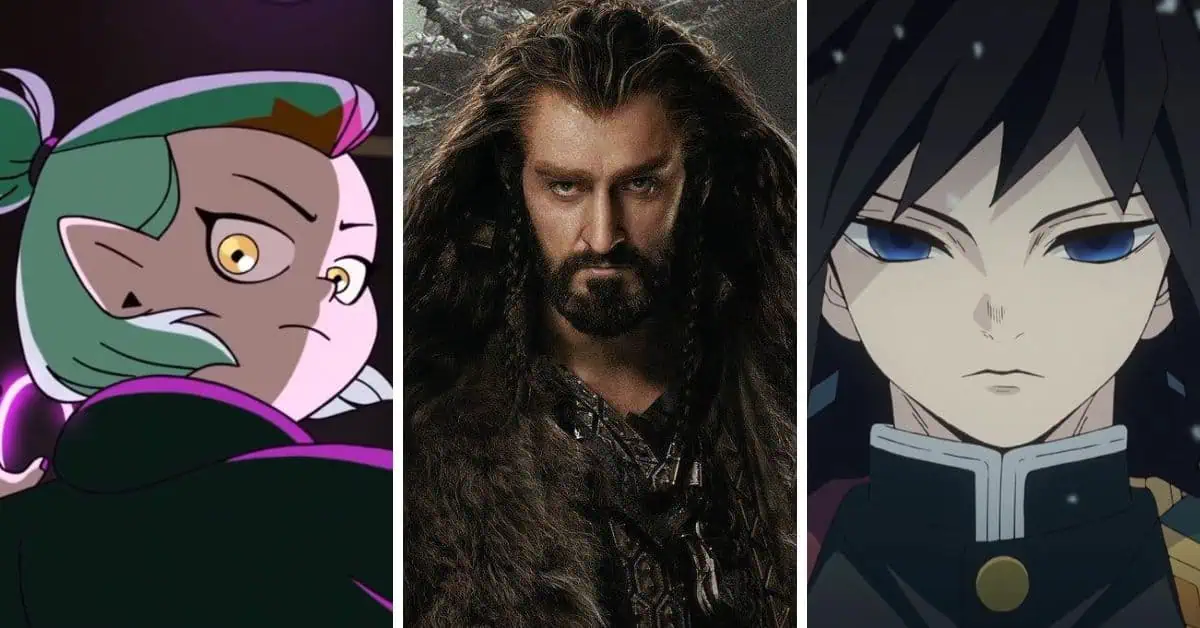

42 Fictional ISTJs
#1 – Thorin Oakenshield from “The Hobbit”

Serious, focused, and protective of his people, Thorin exemplifies some of the best and worst traits of ISTJs. He keeps his eyes on his goals and logically makes plans and contingency plans to achieve them. He is loyal, dutiful, and decisive. At the same time, he can be too quick to judge groups of people that align with bad experiences in his life. For example, since he has had past negative experiences with elves, he assumes that they are all against him and will never redeem themselves from their past failures.
#2 – Okoye from “The Black Panther”

Okoye is an intensely loyal, no-nonsense character deeply motivated by what she knows is right. In the film Black Panther, we see Okoye as a fierce warrior who is firmly rooted in her people’s traditions. Like other SJ heroes, she acts to protect people and to support systems that she believes in.
As a Thinking type, the decisions she makes are primarily based on impersonal criteria (to the point that she states she could kill her husband “without question” for betraying Wakanda). With her tertiary Introverted Feeling, she softens this Thinking side just a bit by also aligning her decisions with what she firmly feels is right rather than blindly following the letter of the law.
#3 Mark Darcy (Bridget Jones Diary)

Reserved yet dignified, Mark Darcy lives according to his principles and hides a romantic, loyal soul under a serious, blunt demeanor. Like most ITJs, Darcy has a deeply-set moral code that guides him through life. While it may not be as obvious as it is with Feeling-Perceiving types, it shows up in his career choices. He is a human-rights barrister who fights for people whose rights are being infringed upon. While he may lack the social bravado of Daniel Cleaver, he has the integrity, loyalty, and authenticity that healthy ISTJs are famous for.
#4 – Bagheera from “The Jungle Book”

Protective and wise, Bagheera may not be warm and cuddly but he’s nonetheless devoted to the young child he found abandoned in the jungle. He always stays level-headed and grounded – on the lookout for risks and dangers and careful to take every precaution. He even goes against his own desires and feelings if he believes it’s in Mowgli’s best interest.
#5 – Hope Van Dyne “Wasp” in “Ant-Man”

As the daughter of Hank Pym, Hope Van Dyne hopes to protect what her father has created, especially from people who aim to use his technology for evil. Like most ISTJs, she’s serious but has a kind, generous heart. She focuses on competence and responsibility, pulling no punches when she sees someone being inefficient or distracted. Her brutally honest way of expressing frustration could be intimidating or off-putting to some, but those who stick with her realize she has an encouraging, protective side underneath her sometimes prickly exterior.
#6 – Arthur from “Inception”

As Dominick Cobb’s right-hand man, Arthur is skilled in the art of infiltrating dreams. Not only is he an excellent researcher but a detail-oriented, dependable planner. While some of the other characters in the film are driven by their impulses and curiosity, Arthur keeps a level head and focuses on carefully accomplishing the task at hand. This is one of the most common ways to spot an ISTJ; they are grounded, methodical, and keep control of themselves at almost all times.
Arthur is the organized one making sure everything is in the right place at the right time. His character in “Inception” gives us a glimpse of why the world so desperately needs ISTJs. They are often the people who notice risks, details, and discrepancies faster than other types. And while they can be serious and by-the-books, many also enjoy discovering fascinating new theories (as exemplified here by Arthur’s interest in dream technology).
#7 – Carl Fredricksen in “Up”

Although grouchy and lonely at first, you soon learn that there’s more to Carl Fredricksen than meets the eye. Underneath his cranky exterior, Carl is a kind person who is deeply devoted to those he loves. While his patience has its limits, he also is determined to do what is right by others, even if it annoys or exhausts him. I think any ISTJ reading this will relate.
In his marriage, Carl enjoyed toying with ideas and possibilities along with his wife (who was likely an ENFP personality type). While ISTJs may seem very grounded and by-the-book at first glance, they enjoy exploring their imagination and hypothetical possibilities with people they trust. They just need time and a feeling of safety to get there.
#8 – Marilla Cuthbert from “Anne of Green Gables”

No-nonsense and diligent, like most ISTJs, Marilla seems overly-serious and strict at first. But as you get to know her, you see that there’s a compassionate, kind-hearted, core to her personality. She cares deeply for others and will always do right by them and follow through on her word. She has a strong moral compass, but she puts up with other people’s scruples and quirks with more tolerance than many other people would. She sees the humor in everyday situations and, with the help of Anne, she realizes that she’s much more open-minded than even she’d initially imagined she could be.
#9 – Captain John Miller from “Saving Private Ryan”

Dedicated and competent, Captain John Miller was tasked with leading his men through the daunting task of retrieving Private James Francis Ryan, whose three brothers had been recently killed in combat. Even in the midst of terrifying odds, Miller was able to keep his eye on his tasks and come up with tactical moves to get past the Germans. While he would have preferred a quiet, peaceful life as an English composition teacher in Pennsylvania, Miller takes his duties seriously and will risk his life to accomplish the missions he’s been given. Like most ISTJs, Miller is pragmatic and down-to-earth. He doesn’t give long, philosophical lectures to his men when they question their duty. He lets them express their questions and gives stories from his own life to motivate them.
#10 – Itzhak Stern from “Schindler’s List”

Although not a truly fictional character, Itzhak Stern is one of the best movie representations of the ISTJ personality type so I wanted to include him here anyway. Even in the face of terrifying and dehumanizing situations, Stern never loses his sense of self or his sense of dignity. As Schindler’s Jewish accountant, he is able to quietly influence a good, moral side of Schindler and use that to save 1,100 Jews during World War II.
I’ve come across people that think Stern is a Feeler because of his drive to help people – and I believe that this is a gross misunderstanding of type. Thinking and Feeling types are equally capable of kindness, selflessness, and good-will. They are equally capable of making sacrifices to help others. In Stern’s case, he discovers ways to save Jews who would be exterminated by giving them jobs in Schindler’s factory. He is guided by his conscience and his moral obligations, but he’s also a shrewd accountant. No detail is missed, and every risk is accounted for. His serious, grounded nature guides him as he works to protect others.
#11 – Tenya Iida from “My Hero Academia”

Tenya Iida, like most ISTJs, is driven by a sense of responsibility and duty. More than anything, he wants to excel at his quirks so that he can live up to his older brother’s example. He may be a rule-follower, but he’s also willing to break the rules when it comes to protecting the legacy of the ones he loves most. He is deeply devoted as a friend and brother, and his discipline and hard-working nature make him a source of strength for his entire UA class. His detail-oriented perceptiveness enables him to notice when anything is out of sync or dangerous, and his skill with logistics helps him to come up with strong plans of action when everyone else is panicking.
#12 – Eddard Stark from Game of Thrones

We all grew to love Eddard Stark, the devoted protector of the Iron Throne and its rightful heir. Despite appearing reserved, his actions spoke louder than words, proving his deep love for his family and justice. In fact, even his wife, Catelyn, attested to the kind heart beneath his stoic exterior. He wasn’t going to become corrupt even if it meant wealth or favor from the king. Thanks to his dutiful nature and his personal values (thank you tertiary Introverted Feeling) he fought for what he believed in until the very end.
#13 – Kento Nanami from Jujutsu Kaisen

I absolutely adore Kento Nanami from Jujutsu Kaisen. He’s responsible, diligent, serious, and always on time. If he has to work overtime, you better watch out!
And while Nanami might look cold and all about business, he deeply cares about others. After all, he’s put his entire life on the line to protect the world from evil curses. He has a protective streak, looking out for Yuji and respecting the fact that he’s a child and shouldn’t have to face serious threats at his age. Even in the midst of hardship, Nanami keeps his eyes on his responsibilities, never letting his competent demeanor falter.
#14 – Mikasa Ackerman from Attack on Titan

Mikasa Ackerman is what happens when you take an ISTJ’s loyalty, crank it up to life-or-death intensity, and give it a set of ODM gear. She’s not just devoted—she’s unmovable. If you’re in her inner circle (which, let’s be real, mostly just means Eren), she will move heaven and earth to protect you. Her introverted sensing (Si) keeps her locked onto the past, onto the promise she made to Eren as kids, onto the idea that as long as she’s by his side, everything will be okay. And once an ISTJ decides something is their responsibility, they don’t question it—they follow through. Every. Single. Time.
Her extroverted thinking (Te) makes her the ultimate soldier—efficient, methodical, and terrifyingly precise. She doesn’t waste time on hypotheticals or emotional monologues. There’s a Titan in front of her? It’s dead. Someone threatens Eren? They’re dead. She processes everything in terms of action—what needs to be done, how to do it, and how fast she can make it happen. And while she may seem cold, she feels deeply—she just expresses it through action, not words. When an ISTJ loves you, they don’t tell you—they show you, over and over again, whether that means making you a scarf or literally killing an army for you. Mikasa doesn’t need to be flashy or emotional to prove she cares. She’s there. And for an ISTJ, that says everything.
#15 – Mitchell Pritchett from Modern Family

Methodical, responsible, detail-oriented, and (sometimes) a bit persnickety, Mitchel Pritchett shows us an ISTJ who is operating in a highly dysfunctional (albeit comical) family setting. As the resident “duty fulfiller”, he is often seen taking on tasks and responsibilities that others avoid; being the voice of reason in many otherwise chaotic situations. His practical and realistic mindset is evident in the way he navigates through life’s challenges, seldomly getting carried away by emotions or hypothetical scenarios.
Mitchell’s preference for structure and order is also a significant aspect of his personality. He appreciates routines and can be a little (or a lot) resistant to change, preferring to operate within his comfort zone. This tendency towards predictability is common for ISTJs who tend to create stability in the world rather than disrupt it. and despite Mitchell’s uptight demeanor, he is deeply loyal to his loved ones, especially his partner, Cameron, and their daughter, Lily. His actions, rather than his words, demonstrate his deep care and commitment, a common quality of ISTJs, and one that definitely deserves attention because their feelings are often misunderstood.
#16 – Rick Grimes from The Walking Dead

Rick Grimes is the kind of ISTJ who wakes up in the apocalypse, takes one look around, and immediately starts getting things under control. He’s not here for panic, sentimentality, or wasting time on what ifs—he’s here to survive. His introverted sensing (Si) keeps him grounded in what he knows—law, order, structure—and even as the world crumbles, he clings to the idea that there’s still a right way to do things. Rick starts as a sheriff trying to uphold justice, but when the world makes it clear that the old rules don’t apply, he rewrites them.
His extroverted thinking (Te) makes him a pragmatic, no-nonsense leader. When there’s a threat, he neutralizes it. When there’s a decision to be made, he makes it. No endless debates, no emotional breakdowns—just cold, calculated action. And while he might seem emotionally closed off, his loyalty to his people is absolute. He doesn’t need to say, I care about you—he proves it by doing whatever it takes to keep his group alive, even when it costs him everything.
#17 – Aki Hayakawa from Chainsaw Man

Aki Hayakawa from Chainsaw Man exemplifies the ISTJ personality type. His responsibility, determination, and commitment as a Devil Hunter give us an idea of how far ISTJs are willing to go to do the right thing. Aki’s thorough, systematic approach to work and preference for facts over fluff line up with the ISTJ mindset. And while many may see Aki as somewhat cold and mean-spirited at first, as you watch the series or read the mangas, you begin to see how loyal, dedicated, and supportive he really is to his friends. While he may not be full of effusive praise and verbal affirmations, he shows his consideration and care through practical support, loyalty, and effective commitment to his team.
#18 – Raymond Holt from Brooklyn Nine-Nine

Raymond Holt is what happens when you take an ISTJ’s love for structure, wrap it in a monotone voice, and sprinkle in just enough deadpan humor to make it legendary. He’s the captain, the rulebook, and the human embodiment of following procedure all in one. His introverted sensing (Si) means he respects tradition, hierarchy, and doing things correctly—which is why watching Jake Peralta bumble through life like a walking HR violation is both infuriating and, on some level, a personal challenge. Holt doesn’t just enforce order—he believes in it. Systems exist for a reason, and in his mind, success isn’t about charisma or gut feelings; it’s about competence and hard work.
But here’s the thing—Holt isn’t a robot. His extroverted thinking (Te) makes him efficient and brutally logical, but his loyalty to his squad runs deep. He might not say he cares in the way others expect, but he shows it through actions—mentoring Amy, defending Rosa, begrudgingly tolerating Jake’s chaos (and, dare we say, even admiring his results). When he does let his guard down, whether through the occasional perfectly timed joke or an impassioned speech, it’s all the more powerful because of it.
#19 – Elinor Dashwood from Sense and Sensibility

Elinor Dashwood, one of the leading ladies from Jane Austen’s classic novel, “Sense and Sensibility,” is a textbook ISTJ. She is the epitome of “sense” in the title, consistently doing what needs to be done in a frustrating, chaotic life situation. Got a secret about an unscrupulous suitor? Elinor will keep it locked away like a vault! She’s reliable to a fault. And while she may appear unfeeling and resigned, she actually does have a great depth of feeling. If you’ve ever wanted to understand the ISTJ’s emotional world and their inner sensitivity you should definitely watch Sense and Sensibility. There’s more to this type than meets the eye! In a world of whirlwind regency romances and high-society scandals, Elinor Dashwood is the calm, steadfast ISTJ in the eye of the storm.
#20 – Brienne of Tarth from Game of Thrones

Sworn sword, steadfast protector, and knight of the Seven Kingdoms, Brienne of Tarth from Game of Thrones is a classic embodiment of the ISTJ personality. I know if I lived in the GoT time period, I would have wanted her by my side (or in front of me, blocking me from threats). Loyal, deeply principled, and dutiful to a fault, Brienne brings some steadiness and ethics to the crazy, unhinged world of Westeros.
Always preferring duty over personal desires, Brienne consistently demonstrates a strong sense of responsibility, becoming an icon of honor in a world riddled with deception. And while she may not be the most expressive when it comes to emotions, her actions speak pretty loudly. Remember when she stood guard all night in the snow for Sansa? That’s the ISTJ dedication right there.
#21 – Kyoka Izumi (Bungou Stray Dogs)

Kyoka Izumi is the kind of ISTJ who was handed a sword, given orders, and expected to never ask why. She’s cold, efficient, and terrifyingly precise—because that’s what the Mafia required her to be. Her introverted sensing (Si) keeps her focused on routine and what’s expected, making her a perfect soldier, but also trapping her in a cycle of obedience that leaves little room for personal agency. She doesn’t question her orders, doesn’t let emotions get in the way—because emotions complicate things, and ISTJs don’t do chaos. But beneath that icy exterior, there’s a girl who’s still trying to figure out who she is outside of the role she was forced into.
When she joins the Armed Detective Agency, she starts to break the cycle, but it’s not easy. Her extroverted thinking (Te) makes her a natural problem-solver, so she adapts—slowly, methodically—learning to fight on her terms, in a way that aligns with her own sense of right and wrong (tertiary Introverted Feeling for the win!). It’s not a dramatic transformation, because ISTJs don’t work like that. It’s small shifts, one choice at a time—knocking out targets instead of ending them, questioning orders instead of blindly following them. She’s proof that ISTJs aren’t just rule-followers; they’re rule-evaluators. And when they find a better way—one that actually fits their values—they’ll commit to it just as fiercely as they did the old one.
#22 – Marlin (Finding Nemo)

Protective, reserved, and dutiful, Marlin believes it’s his primary duty to take care of his family. He lays down strict rules, and is consistent in every area of his lifestyle. Like most ISTJs, he has a sensitive and caring side, but he shows that by preserving stability, trying to keep his son out of any potential danger. He prefers sticking to what he knows and struggles with the unknown. But faced with the possibility of losing Nemo forever, he does whatever it takes to brave an uncertain world and rescue him.
#23 – Illumi Zoldyck (Hunter X Hunter)

Illumi Zoldyck perfectly embodies the unhealthy ISTJ personality with his cold, methodical approach to life. Emotionally detached and calculating, Illumi takes a pragmatic, ruthless approach to protecting his brother Killua, using his Nen ability to control him for the sake of his survival and obedience. His twisted love for Killua and loyalty to family show Illumi’s rigid attachment to duty, even when it leads to morally questionable actions. Though he’s willing to risk his life for the family, he maintains a cold detachment, even insinuating he’d be fine with ending Alluka, whom he doesn’t fully consider family. Illumi’s cold, pragmatic approach, strict loyalty, and calculated reasoning are classic ISTJ traits, making him one of the more memorable ISTJ anime characters.
#24 – Rip Wheeler (Yellowstone)

Rip Wheeler from Yellowstone is known for his loyalty, practicality, and dedication to the Dutton family. No matter what is asked of him, he approaches the situation with deep commitment to the people he believes are his “family.” As John Dutton’s right-hand man, Rip is methodical and dependable, taking a no-nonsense approach to his responsibilities on the ranch (even the ones that are a little morally ambiguous). Rip’s emotional restraint is evident, as he rarely shows vulnerability, preferring to handle problems with quiet efficiency and a cold, calculated demeanor. Yet underneath the surface he has much deeper feelings than anyone (except perhaps Beth) realizes. Like most ISTJs, he feels deeply, but it’s all locked beneath an outer demeanor of reserve and stoicisim.
#25 – Astrid from How to Train Your Dragon

From the beginning, Astrid is known for being tough-minded, dedicated, and focused. She takes her responsibilities seriously, always pushing herself to follow rules and perform well in her training. When Hiccup bonds with Toothless, Astrid is suspicious and follows protocol, determined to let the village know what’s going on in order to circumvent danger. Over time, she adapts, but only after careful consideration. She has to experience firsthand what Toothless is capable of before she can really trust that he’s safe. Astrid’s blend of discipline, loyalty, and adherence to rules makes her a classic ISTJ who values order and responsibility.
#26 – Claire (Fleabag)

Cautious, hard-working, and no-nonsense, Claire is the juxtaposition to Fleabag’s irreverent nature in Amazon Prime’s Fleabag. She doesn’t like to show emotions and often focuses on keeping things structured and sensible, even if it makes her seem stiff. It’s difficult for her to do what she wants, because she’s so focused on her responsibilities. And her loyalty to her sister is often overwhelming for her, because they think so differently from each other. While Claire prizes stability, practicality, and discipline, Fleabag is troubled and lives it out in unpredictable, risky choices. Yet her loyalty remains strong, and the sisters find a way to forge a bond even in the face of stark differences and a troubled family life.
#27 – Amy Santiago (Brooklyn 99)

Amy Santiago from Brooklyn Nine-Nine is a textbook ISTJ, known for her obsessive organization, dedication to rules, and color-coded binders. She adores structure, lists, alphabetizing, and scheduling. This adoration for all things organized is typical of the ISTJ personality type. She gets a thrill from creating order out of chaos, and is happiest when her life is predictable and steady. She serves as a hilarious juxtaposition to Jake Peralta’s zany, irreverent, ENTP character.
#28 – Ross Geller (FRIENDS)

As a paleontologist, Ross thrives in a world of facts and logic, often bringing his orderly, planned-out mindset into his personal life. From his infamous insistence on correcting people (“It’s unagi!”) to his meticulous approach to moving furniture (“PIVOT!”), Ross’s need for caution and control can make him both endearing and hilariously over-the-top. His loyalty is another hallmark of his ISTJ personality, as shown in his on-again, off-again relationship with Rachel, where he’s fiercely devoted—sometimes more than anyone asked for. Even his insistence on sticking to the “we were on a break!” narrative shows his ISTJ stubbornness in following his version of the rules. Despite his quirks, Ross’s commitment to his friends and his sense of responsibility make him the lovable but overly logical character we all can’t help but root for.
#29 – Rita (The Handmaid’s Tale)

As a Martha in the rigid world of Gilead, Rita takes her responsibilities seriously, following the rules of the regime even while she inwardly struggles. She performs her tasks—cooking, cleaning, and caring for the household—with careful diligence, never allowing her emotions to interfere with her work. And while she may appear loyal to the system on the outside, she performs quiet acts of rebellion when no one is looking; like helping June escape or passing messages in secret. Nothing can make her betray her morals and principles, even in a world where everything is organized to make that seem impossible.
#30 – Mike Ehrmantraut (Breaking Bad, Better Call Saul)

Mike Ehrmantraut from Better Call Saul is one of my personal favorite ISTJ characters. He’s always super calm, always has a plan, and never reveals his inner feelings. That’s pure ISTJ. Mike’s all about doing the job right—whether it’s fixing a parking booth or handling some shady business, he’s got this methodical approach that never wavers. He also has a strong moral code—he follows his own set of rules, no matter how tough the situation gets. But when it comes to his family, especially his granddaughter, you can see how loyal he is. He’ll do anything for her, and that protective instinct is another iconic ISTJ trait.
#31 – David Kaplan (A Real Pain)

“It was our country. They kicked us out ’cause they thought we were cheap.” – David Kaplan
David Kaplan is the definition of grounded. He’s steady, responsible, and practical—the kind of guy who double-checks the itinerary, keeps track of expenses, and despises being late. His introverted sensing (Si) makes him deeply connected to the past, not just in an abstract, sentimental way, but in a this-is-where-we-come-from, this-matters kind of way. Their trip to Poland isn’t just a casual vacation for David—it’s a way to honor family history, to acknowledge what came before, to process something real. That said, he’s going to process it privately; most of what he feels is kept locked under the surface.
His extroverted thinking (Te) kicks in whenever his cousin, Benji, inevitably spirals into chaos. David operates on logic, on rules, on what should be done, which makes Benji’s impulsive, boundary-pushing nature an endless source of frustration. While Benji crashes through life in an emotional whirlwind, David is left cleaning up the mess, smoothing things over with their tour group, and quietly wondering if there’s a way to make his cousin normal—or at least tolerable.
But despite his exasperation, David is loyal. That’s the ISTJ’s core—duty. He loves Benji, even when loving him feels like a full-time job. He may not express his emotions in grand gestures, but his commitment is solid. He’s there. He’s always there, even when it’s a real pain.
#32 – Frank Castle “The Punisher”
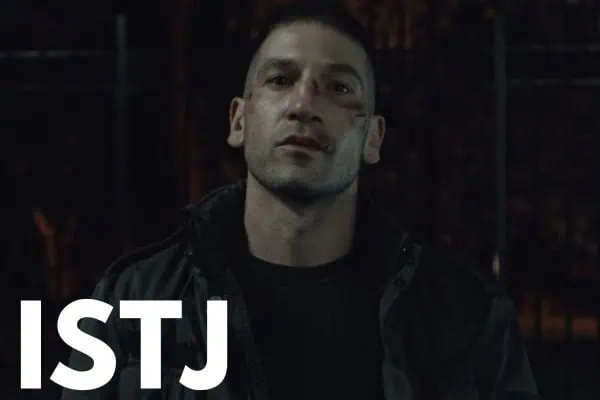
“People that can hurt you, the ones that can really hurt you, are the ones that are close enough to do it. People that get inside you and tear you apart, and make you feel like you’re never gonna recover.”
Frank Castle is an ISTJ with a more rebellious, vengeful streak. His introverted sensing (Si) is his foundation, anchoring him in the past, in the day his family was murdered. That moment isn’t just a memory; it’s the event that shaped his entire existence. Everything he does, every criminal he puts down, is a direct response to that trauma, relived over and over in his mind. His moral code may be extreme, but it’s consistent, anchored in an ironclad belief that justice must be served—by any means necessary.
His extroverted thinking (Te) is what makes him terrifyingly efficient. Castle doesn’t act on impulse; he operates like a soldier on a mission. He studies his targets, gathers intel, and executes his plans with brutal exactness. There’s no emotional grandstanding, no wavering. If you’re on his list, you’re as good as dead. His cold, calculated approach is what separates him from other vigilantes—he’s not looking for a fight; he’s looking to eliminate threats permanently.
#33 – Peter Sutherland (The Night Agent)

“It’s gonna be alright. I’m on my way.”
Peter Sutherland shows us the discipline and focus of the ISTJ in hero form. His introverted sensing (Si) keeps him grounded in rules, reality, and practicality, making him the perfect government agent—until corruption forces him to question everything. Even then, Peter doesn’t abandon his principles; he adapts while holding onto his core values. His extroverted thinking (Te) makes him sharp and pragmatic, always focused on logic and forward momentum over emotion. His care for others, especially Rose, isn’t shown through words but through protection, strategy, and relentless problem-solving.
What makes Peter compelling is the tension between his rigid worldview and the unpredictable chaos around him. He wants the world to be clear-cut—good versus evil, right versus wrong—but reality is far messier. His tertiary introverted feeling (Fi) guides him through this moral gray area, pushing him to follow his own internal code when the system fails. He may seem emotionally closed off, but beneath that stoic exterior is a man driven by conviction, loyalty, and a quiet but powerful need to do what’s right—no matter the cost.
#34 – Caitlyn Kiramman (Arcane)

“This city needs healing. More than I ever realized.”
Caitlyn Kiramman grew up in a house where everything was handed to her on a silver platter, but instead of leaning into the privilege, she took one look at her coddled life and said, Yeah, no thanks. I’d rather get shot at for a living. Her brain is wired for responsibility and justice—introverted sensing (Si) keeps her locked onto duty, while extroverted thinking (Te) makes her aggressively efficient at cutting through red tape. If the system won’t work the way it’s supposed to, she’ll forge a couple of orders, bust a prisoner out of jail (hey, Vi), and handle it herself. Not because she wants to break the rules, but because rules that protect the corrupt and ignore the innocent aren’t rules worth following.
And that’s the thing about Caitlyn—she’s logical, she’s methodical, but she’s also a human being with feelings (yes, ISTJs have feelings). They just sit there, shoved into a mental filing cabinet labeled Sort This Out Later. But when grief finally catches up—when Jinx blows up her entire world—Caitlyn starts making choices that are a little less about justice and a lot more about vengeance. And this is where the ISTJ stubborn streak becomes both her strength and her Achilles’ heel. She doubles down, hard, convinced that she’s the only one who can fix things, even if it means losing herself in the process. But at the end of the day, Caitlyn doesn’t just sit in the wreckage—she picks up the pieces, recalibrates, and gets back to work. Because if there’s one thing an ISTJ doesn’t do, it’s quit.
#35 – Paul Hunham (The Holdovers)
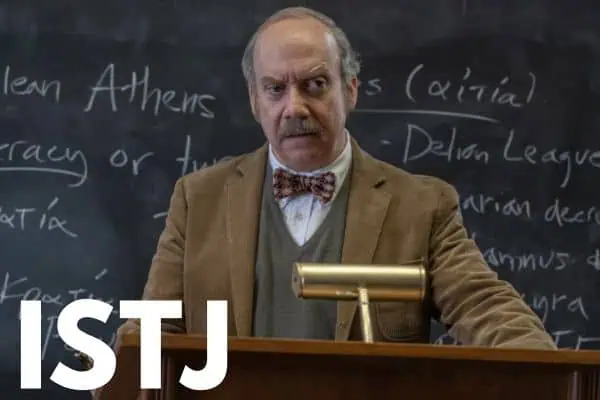
“There’s nothing new in human experience, Mr. Tully. Each generation thinks it invented debauchery or suffering or rebellion, but man’s every impulse and appetite from the disgusting to the sublime is on display right here all around you. So, before you dismiss something as boring or irrelevant, remember, if you truly want to understand the present or yourself, you must begin in the past. You see, history is not simply the study of the past. It is an explanation of the present.”
Paul Hunham is what happens when you take an ISTJ’s love for structure, pack it into a tweed blazer, and let it marinate in disappointment for a few decades. He’s the guy who believes in tradition, discipline, and the unimpeachable value of a real education—none of this watered-down, feel-good nonsense. His introverted sensing (Si) keeps him rooted in history, both as a subject and as a worldview. Everything worth knowing has already been written, and every mistake worth making has already been made (several times, if you’d just read the textbook). But, of course, he’s stuck in a modern world full of students who’d rather be anywhere else, which means he spends most of his time being either deeply exasperated or begrudgingly amused by the sheer persistence of teenage idiocy.
And yet, for all his grumbling, Paul isn’t just a cranky old-school academic—he’s got layers, whether he likes it or not. His extroverted thinking (Te) makes him blunt and exacting, but it’s his quieter, more reluctant compassion that sneaks up on you. He sees himself in Angus, not that he’d ever admit it, and that recognition chips away at the armor he’s spent years reinforcing. Their relationship isn’t warm or sentimental; it’s built on bickering, shared antidepressants, and a handshake that says more than any sappy monologue ever could. Paul may be the kind of guy who insists on doing things by the book, but by the end, he’s rewritten a few pages—not for the sake of breaking rules, but because, sometimes, understanding is more important than discipline.
#36 – Giyu Tomioka (Demon Slayer)

“Even if something does happen, my heart will never waver. We are the nine strongest swordsmen in our organization. The literal ‘Hashira’ of the Demon Slayer Corps. That is why we will never forget who we wield our swords for and who we are protecting. There are things that must be supported. So the Hashira must act as Hashira.”
Giyu Tomioka is what happens when you take an ISTJ’s sense of duty, strip away any inclination for small talk, and wrap it in a haori of existential exhaustion. He’s the guy who will save your life without a second thought but will also stand there in complete, unreadable silence while you try to figure out if he actually likes you. His introverted sensing (Si) runs deep—he’s tied to the past, carrying the weight of guilt, loss, and a strict sense of what’s right, even when it isolates him. Rules and hard work keep him from facing his inner demons, until they just can’t anymore.
Despite his icy exterior, Giyu isn’t unfeeling—he’s just spent so long suppressing his emotions that they’ve compacted into a dense, immovable block of do not engage. His extroverted thinking (Te) makes him brutally efficient and no-nonsense, but interpersonally? Yeah, not so much. He struggles to connect, even with people who want to understand him, because vulnerability isn’t part of the equation he’s used to solving. Still, there are cracks in the armor—small moments of unexpected kindness, of protection that goes beyond duty. He doesn’t need recognition, and he certainly doesn’t need validation. But in those rare instances when he does speak his mind, it’s clear: Giyu is less cold and distant than he is afraid of what getting too close might cost.
#37 – Ramsey ‘The SBO’ (The Great Escape)
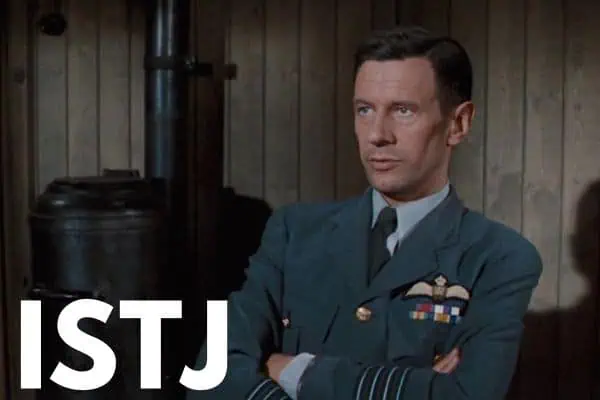
“Colonel Von Luger, it is the sworn duty of all officers to try to escape. If they cannot escape, then it is their sworn duty to cause the enemy to use an inordinate number of troops to guard them, and their sworn duty to harass the enemy to the best of their ability.”
Captain Ramsey is the kind of man who doesn’t just follow duty—he is duty. He’s the ISTJ character blueprint: steady, disciplined, and completely unshakable in his principles, even when trapped behind enemy lines. His introverted sensing (Si) gives him an ironclad respect for tradition, protocol, and responsibility, which is why he sees it as his sworn duty to resist, to disrupt, and to make life as difficult as possible for the enemy. Escaping isn’t just about freedom; it’s about strategy, about forcing the Germans to waste time, energy, and resources. Even though his own war wounds make it difficult for him to escape, he still oversees and authorizes the operation, offering guidance, structure, and support. He’s the backbone of the operation—not flashy, not reckless, but resolute.
His extroverted thinking (Te) helps him know how to run everything efficiently. He has no issue enforcing discipline, maintaining order, and making unpopular decisions, so be it. He’s been in trouble with the Gestapo before, and it hasn’t changed his approach—he doesn’t bend to pressure. And yet, for all his rigidity, Ramsey isn’t without humanity. He understands sacrifice, he understands loss, and he understands that even in a prison camp, leadership matters. He likely won’t escape, but that doesn’t mean he won’t fight. And that’s what makes him such a perfect ISTJ—his strength isn’t in defying the system, but in holding the line, in making sure the men around him never forget who they are, even in captivity.
#38 – Amity Blight (The Owl House)
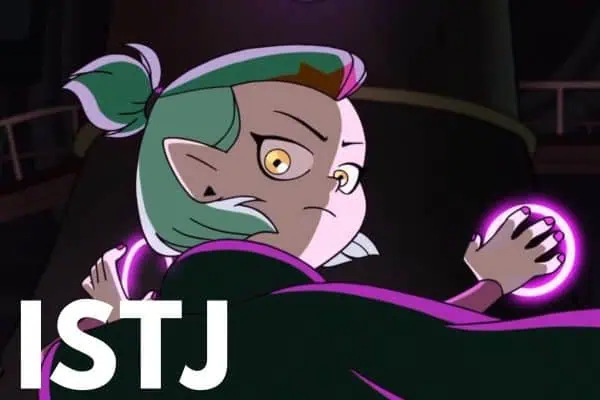
“As “Top Student,” it is my duty to tell you to keep at it! Even you could get a passing grade someday.”
Amity Blight is what happens when an ISTJ perfectionist realizes that the rulebook she’s been following was written by the wrong people. She starts off as your classic top-tier overachiever—driven, competitive, and absolutely not here to play second fiddle to anyone. Her introverted sensing (Si) makes her hyper-aware of expectations, traditions, and her place in the social hierarchy, and for a while, she clings to it because, well, what else is she supposed to do? Her entire life has been one long performance—get the best grades, join the Emperor’s Coven, don’t embarrass the Blight name. But then Luz Noceda crashes into her world like a walking exclamation point, and suddenly, Amity is faced with something she’s never encountered before: someone who doesn’t care about rules, status, or how things are supposed to be. And it wrecks her. In the best way possible.
What makes Amity’s arc so satisfying isn’t just that she softens—it’s that she chooses to. Her extroverted thinking (Te) makes her decisive and productive, so once she decides she’s done living for other people’s expectations, she commits. She stands up to her mother. She ditches the toxic friendships. She rewrites the script of who she’s allowed to be. And yeah, she’s still got some lingering perfectionist tendencies (if overachieving was a sport, she’d have Olympic gold), but now, she’s using that drive for herself—for adventure, for magic, for a life where she gets to love who she wants and be who she wants. She’s proof that ISTJs aren’t just rigid rule-followers; they’re builders. And when they decide to build a life that actually fits them? Nothing gets in their way.
#39 – Alex Dunphy (Modern Family)

“You’re never alone when you have books.”
Alex Dunphy is the human embodiment of I did the extra credit just in case. She’s disciplined, responsible, and absolutely unwilling to tolerate nonsense, which is unfortunate given the fact that she was born into this family. Her introverted sensing (Si) makes her the ultimate rule-follower, not because she blindly trusts authority, but because facts, common sense, and practicality are what make sense to her. While Haley is out partying and Luke is, well, being Luke, Alex is calculating her GPA down to the decimal and ensuring she remains academically untouchable. She doesn’t just try for competence; she demands it, which is why dealing with her often chaotic family is both a test of patience and an ongoing source of existential dread.
#40 – Tigress (Kung Fu Panda)
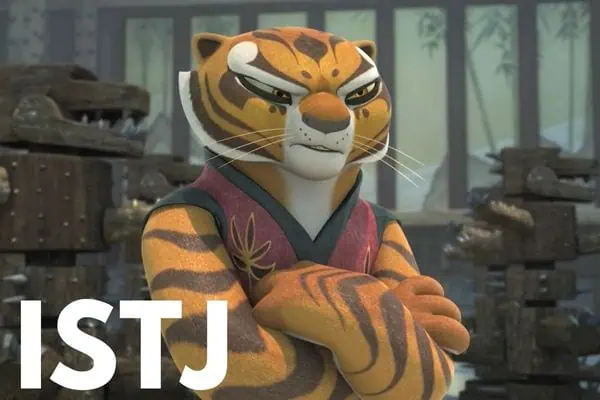
“I mean, you don’t belong in the Jade Palace. You’re a disgrace to kung fu and if you have any respect for who we are and what we do, you will be gone by morning.“
ISTJ characters don’t get much more lethal than Tigress. She’s the definition of exactness—every move calculated, every strike intentional, every rule followed to the letter. Her introverted sensing (Si) makes her deeply committed to tradition and structure, which is why watching Po stumble his way into becoming the Dragon Warrior is nothing short of a personal attack on her entire belief system. She trained relentlessly for this title. She earned it. And now some clumsy, noodle-loving panda is just handed the role? It’s enough to make her fur stand on end.
Her extroverted thinking (Te) makes her a natural leader—blunt, pragmatic, and efficient to a fault. If there’s a mission, she executes it. If there’s a threat, she neutralizes it. Feelings? Irrelevant. Except, of course, they’re not. Beneath all that rigid control is someone who feels deeply but refuses to let emotions interfere with duty. Over time, she learns that strength isn’t just about power and skill—it’s also about trust, about connection, about believing in others even when they don’t fit the mold. And when she finally allows herself to respect and care for Po, not just as a teammate but as a friend, it doesn’t make her weaker. It makes her stronger. Because ISTJs don’t need grand gestures or flowery speeches to prove their loyalty—they just show up, time and time again, ready to fight for the people they’ve chosen.
#41 – Sheldon Cooper (The Big Bang Theory, Young Sheldon)

“While I subscribe to the many worlds theory, which posits the existence of an infinite number of Sheldons… I assure you that in none of them am I dancing.”
Sheldon Cooper is what happens when you take an ISTJ’s love for order, crank it up to 11, and remove any lingering concern for social norms. His introverted sensing (Si) runs the show—he wants…no, needs…routine, clings to tradition (his spot on the couch is basically sacred ground), and has an encyclopedic memory that makes him an insufferable trivia opponent. From his rigid bathroom schedule to his emergency preparedness drills, everything in his life follows a carefully designed system. His extroverted thinking (Te) makes him blunt to the point of injury—if something is illogical, he will tell you, and no, he will not sugarcoat it. The man has the emotional subtlety of a brick, and he’s totally fine with that.
But here’s the thing—Sheldon isn’t trying to be difficult. He genuinely believes that rules, logic, and stability are what keep the world from descending into chaos. And underneath all the contracts, condescension, and superiority complexes, there’s an ISTJ who cares—he just doesn’t express it in ways that normal humans recognize. Instead of sentimental words, he’ll make sure your Wi-Fi is fast, memorize your allergies, or force you to follow the roommate agreement because structure means stability, and stability means he likes having you around. Over time, Sheldon softens (slightly), learning that while logic might be the foundation of the universe, relationships require a different kind of effort.
#42 – Noodle (Wonka)
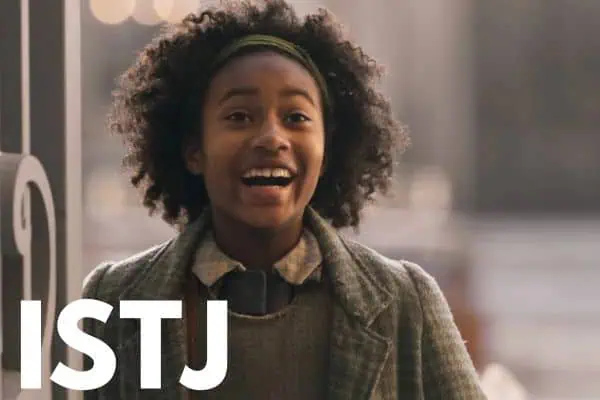
“The greedy beat the needy, Willy. It’s just the way of the world.”
Noodle is the kind of ISTJ who takes life’s absolute worst circumstances, squares her shoulders, and just deals with it. She grew up in a rigged system, forced into servitude by people who saw her as disposable, but instead of breaking, she adapted. Her introverted sensing (Si) keeps her grounded in what she knows—hard work, survival, and the cold reality that nothing in life comes easy. But in spite of everything, she doesn’t let bitterness consume her. If anything, it makes her even more determined to do right by the people who actually matter. She’s practical, steady, and sharp enough to spot a con from a mile away (which, given the world she lives in, is a necessary skill). When she meets Willy Wonka, she’s wary at first—because of course she is—but once he proves himself, she’s all in. That’s the ISTJ way: trust isn’t given freely, but when it’s earned, it’s unshakable.
Her extroverted thinking (Te) makes her the planner, the realist, the one who makes sure the dreamers don’t accidentally get themselves killed. Breaking out of the Scrubbit household? Helping expose the Chocolate Cartel? Yeah, those things don’t happen without Noodle keeping everyone focused and making sure the details actually make sense.
What Are Your Thoughts?
Did you enjoy this article? Do you have any suggestions for ISTJ characters? Let us know in the comments!
Find out more about your personality type in our eBooks, Discovering You: Unlocking the Power of Personality Type, The INFJ – Understanding the Mystic, The INFP – Understanding the Dreamer, and The INTJ – Understanding the Strategist. You can also connect with me via Facebook, Instagram, or Twitter!
Other Articles You Might Enjoy:
24 Signs That You’re an ISTJ Personality Type
The Flirting Style of the ISTJ Personality Type





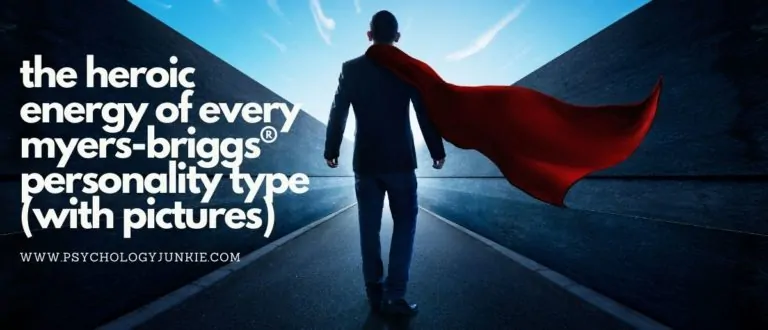




I think Harry Potter is an ISFP rather than ISTJ. I think with Harry, Fi is really his dominant function with his strong personal moral code that defies all peer pressure and social expectations. While his Se co-pilot is evident in his natural talent on the quidditch field and his general ability to get in to action and be in the moment when required.
Hermione on the other hand is more like an ISTJ. She also has a strong moral code but her natural strength really is in her memory (Si) and efficient organization, planning and getting things done in time (Te). She’s the one that always has her homework done well in advance, she organized and executed “Dumbledore’s Army” in the 5th book and even had to convince Harry to do it. She makes elaborate preparations before they set off on their journey in the 7th book. She is a master at getting projects done.
First as always, Susan Storm offers so much valuable information on the subject of personality type. I have been studying type since the late 90s, early 2000s and still learn so much from her as an ISTP type. With that said, when I look at SJs in general but particularly ISTJ types, it raises the concept of nature vs nurture. Specifically are these types actually ISTJs by nature and how much of determining their type has been influenced by their environment whether it is adaptation to community or due to their work environment?
Sounds right!! I’m Okoye and Rick Grimes. I thought Sasha was an ISTJ too.